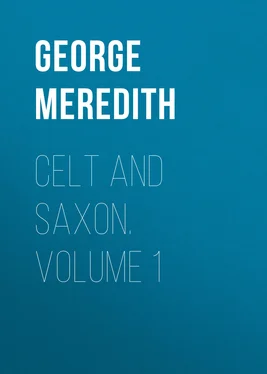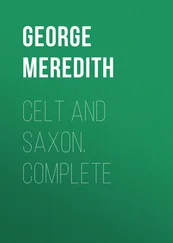George Meredith - Celt and Saxon. Volume 1
Здесь есть возможность читать онлайн «George Meredith - Celt and Saxon. Volume 1» — ознакомительный отрывок электронной книги совершенно бесплатно, а после прочтения отрывка купить полную версию. В некоторых случаях можно слушать аудио, скачать через торрент в формате fb2 и присутствует краткое содержание. Жанр: foreign_prose, literature_19, foreign_antique, на английском языке. Описание произведения, (предисловие) а так же отзывы посетителей доступны на портале библиотеки ЛибКат.
- Название:Celt and Saxon. Volume 1
- Автор:
- Жанр:
- Год:неизвестен
- ISBN:нет данных
- Рейтинг книги:3 / 5. Голосов: 1
-
Избранное:Добавить в избранное
- Отзывы:
-
Ваша оценка:
- 60
- 1
- 2
- 3
- 4
- 5
Celt and Saxon. Volume 1: краткое содержание, описание и аннотация
Предлагаем к чтению аннотацию, описание, краткое содержание или предисловие (зависит от того, что написал сам автор книги «Celt and Saxon. Volume 1»). Если вы не нашли необходимую информацию о книге — напишите в комментариях, мы постараемся отыскать её.
Celt and Saxon. Volume 1 — читать онлайн ознакомительный отрывок
Ниже представлен текст книги, разбитый по страницам. Система сохранения места последней прочитанной страницы, позволяет с удобством читать онлайн бесплатно книгу «Celt and Saxon. Volume 1», без необходимости каждый раз заново искать на чём Вы остановились. Поставьте закладку, и сможете в любой момент перейти на страницу, на которой закончили чтение.
Интервал:
Закладка:
These being his reflections, he at once accepted a view of her that so agreeably quieted his perplexity, and he leapt out of his tangle into the happy open spaces where the romantic things of life are as natural as the sun that rises and sets. There you imagine what you will; you live what you imagine. An Adiante meets her lover another Adiante, the phantom likeness of her, similar to the finger-tips, hovers to a meeting with some one whose heart shakes your manful frame at but a thought of it. But this other Adiante is altogether a secondary conception, barely descried, and chased by you that she may interpret the mystical nature of the happiness of those two, close-linked to eternity, in advance. You would learn it, if she would expound it; you are ready to learn it, for the sake of knowledge; and if you link yourself to her and do as those two are doing, it is chiefly in a spirit of imitation, in sympathy with the darting couple ahead . . . .
Meanwhile he conversed, and seemed, to a gentleman unaware of the vaporous activities of his brain, a young fellow of a certain practical sense.
'We have not much to teach you in: horseflesh,' Mr. Adister said, quitting the stables to proceed to the gardens.
'We must look alive to keep up our breed, sir,' said Patrick. 'We're breeding too fine: and soon we shan't be able to horse our troopers. I call that the land for horses where the cavalry's well-mounted on a native breed.'
'You have your brother's notions of cavalry, have you!'
'I leave it to Philip to boast what cavalry can do on the field. He knows: but he knows that troopers must be mounted: and we're fineing more and more from bone: with the sales to foreigners! and the only chance of their not beating us is that they'll be so good as follow our bad example. Prussia's well horsed, and for the work it's intended to do, the Austrian light cavalry's a model. So I'm told. I'll see for myself. Then we sit our horses too heavy. The Saxon trooper runs headlong to flesh. 'Tis the beer that fattens and swells him. Properly to speak, we've no light cavalry. The French are studying it, and when they take to studying, they come to the fore. I'll pay a visit to their breeding establishments. We've no studying here, and not a scrap of system that I see. All the country seems armed for bullying the facts, till the periodical panic arrives, and then it 's for lying flat and roaring— and we'll drop the curtain, if you please.'
'You say we,' returned Mr. Adister. 'I hear you launched at us English by the captain, your cousin, who has apparently yet to learn that we are one people.'
'We 're held together and a trifle intermixed; I fancy it's we with him and with me when we're talking of army or navy,' said Patrick. 'But Captain Con's a bit of a politician: a poor business, when there's nothing to be done.'
'A very poor business!' Mr. Adister rejoined,
'If you'd have the goodness to kindle his enthusiasm, he'd be for the first person plural, with his cap in the air,' said Patrick.
'I detest enthusiasm.
'You're not obliged to adore it to give it a wakener.
'Pray, what does that mean?'
Patrick cast about to reply to the formal challenge for an explanation.
He began on it as it surged up to him: 'Well, sir, the country that's got hold of us, if we 're not to get loose. We don't count many millions in Europe, and there's no shame in submitting to force majeure, if a stand was once made; and we're mixed up, 'tis true, well or ill; and we're stronger, both of us, united than tearing to strips: and so, there, for the past! so long as we can set our eyes upon something to admire, instead of a bundle squatting fat on a pile of possessions and vowing she won't budge; and taking kicks from a big foot across the Atlantic, and shaking bayonets out of her mob-cap for a little one's cock of the eye at her: and she's all for the fleshpots, and calls the rest of mankind fools because they're not the same: and so long as she can trim her ribands and have her hot toast and tea, with a suspicion of a dram in it, she doesn't mind how heavy she sits: nor that 's not the point, nor 's the land question, nor the potato crop, if only she wore the right sort of face to look at, with a bit of brightness about it, to show an idea inside striking alight from the day that's not yet nodding at us, as the tops of big mountains do: or if she were only braced and gallant, and cried, Ready, though I haven't much outlook! We'd be satisfied with her for a handsome figure. I don't know whether we wouldn't be satisfied with her for politeness in her manners. We'd like her better for a spice of devotion to alight higher up in politics and religion. But the key of the difficulty's a sparkle of enthusiasm. It's part business, and the greater part sentiment. We want a rousing in the heart of us; or else we'd be pleased with her for sitting so as not to overlap us entirely: we'd feel more at home, and behold her more respectfully. We'd see the policy of an honourable union, and be joined to you by more than a telegraphic cable. That's Captain Con, I think, and many like him.'
Patrick finished his airy sketch of the Irish case in a key signifying that he might be one among the many, but unobtrusive.
'Stick to horses!' observed Mr. Adister.
It was pronounced as the termination to sheer maundering.
Patrick talked on the uppermost topic for the remainder of their stroll.
He noticed that his host occasionally allowed himself to say, 'You Irish': and he reflected that the saying, 'You English,' had been hinted as an offence.
He forgot to think that he had possibly provoked this alienation in a scornfully proud spirit. The language of metaphor was to Mr. Adister fool's froth. He conceded the use of it to the Irish and the Welsh as a right that stamped them for what they were by adopting it; and they might look on a country as a 'she,' if it amused them: so long as they were not recalcitrant, they were to be tolerated, they were a part of us; doubtless the nether part, yet not the less a part for which we are bound to exercise a specially considerate care, or else we suffer, for we are sensitive there: this is justice but the indications by fiddle-faddle verbiage of anything objectionable to the whole in the part aroused an irritability that speedily endued him with the sense of sanity opposing lunacy; when, not having a wide command of the undecorated plain speech which enjoyed his approval, he withdrew into the entrenchments of contempt.
Patrick heard enough to let him understand why the lord of Earlsfont and Captain Con were not on the best of terms. Once or twice he had a twinge or suspicion of a sting from the tone of his host, though he was not political and was of a mood to pity the poor gentleman's melancholy state of solitariness, with all his children absent, his wife dead, only a niece, a young lady of twenty, to lend an air of grace and warmth to his home.
She was a Caroline, and as he had never taken a liking to a Caroline, he classed her in the tribe of Carolines. To a Kathleen, an Eveleen, a Nora, or a Bessy, or an Alicia, he would have bowed more cordially on his introduction to her, for these were names with portraits and vistas beyond, that shook leaves of recollection of the happiest of life—the sweet things dreamed undesiringly in opening youth. A Caroline awakened no soft association of fancies, no mysterious heaven and earth. The others had variously tinted skies above them; their features wooed the dream, led it on as the wooded glen leads the eye till we are deep in richness. Nor would he have throbbed had one of any of his favourite names appeared in the place of Caroline Adister. They had not moved his heart, they had only stirred the sources of wonder. An Eveleen had carried him farthest to imagine the splendours of an Adiante, and the announcement of the coming of an Eveleen would perchance have sped a little wild fire, to which what the world calls curiosity is frozenly akin, through his veins.
Читать дальшеИнтервал:
Закладка:
Похожие книги на «Celt and Saxon. Volume 1»
Представляем Вашему вниманию похожие книги на «Celt and Saxon. Volume 1» списком для выбора. Мы отобрали схожую по названию и смыслу литературу в надежде предоставить читателям больше вариантов отыскать новые, интересные, ещё непрочитанные произведения.
Обсуждение, отзывы о книге «Celt and Saxon. Volume 1» и просто собственные мнения читателей. Оставьте ваши комментарии, напишите, что Вы думаете о произведении, его смысле или главных героях. Укажите что конкретно понравилось, а что нет, и почему Вы так считаете.












